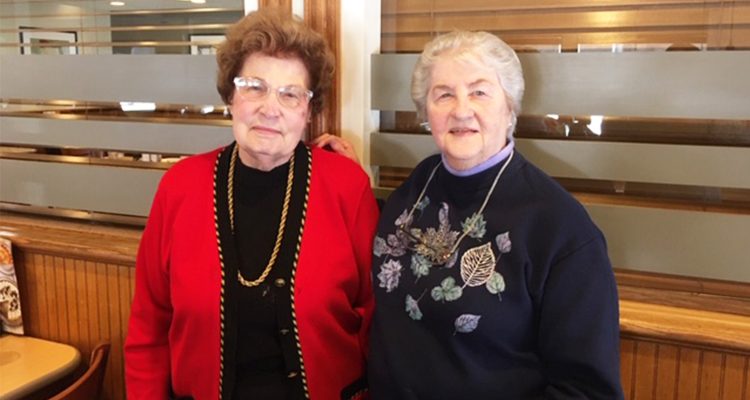Editor’s note: Throughout March — Women’s History Month — Weelunk will feature stories about women who have made history and women who are making history.
Two women, born and raised in Wheeling, West Virginia, have seen more of the world in their lifetimes than most ever dream of seeing. They have also earned the titles of being two of the highest-ranking female military nurses in Wheeling today.Despite their similarities and honors, and the fact that they both live in the same town that gave them the start in their careers, they hadn’t met. That is until local historian Margaret Brennan decided enough was enough and scheduled a lunch with the two of them.
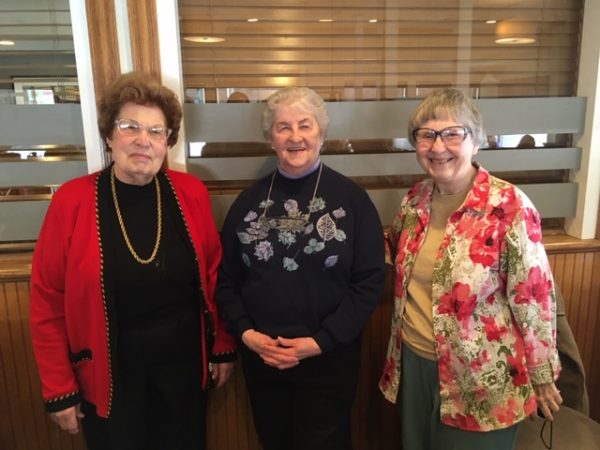
“These military women have something special about them,” Margaret strongly believes. Colonel Judith Lemery Sanders and Lieutenant Commander Marie Pinto were raised in Wheeling and now choose to enjoy their retirement here, after their many years of service. Meeting on a bitterly cold and sunny Saturday for lunch on the day before Women’s History Month began, the stories began to flow between the two women as they talked of their own histories during their time in the Air Force and the Navy.
“There was a time when I wanted to be a nun, but I really wanted to be a nurse.”— Col. Judy Sanders
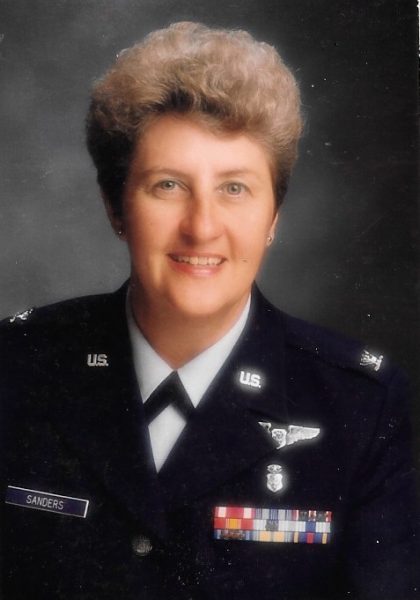
Col. Judy Sanders was raised in the Catholic school system, attended grade school at Blessed Trinity Grade School on Wheeling Island and graduated in 1955 from St. Joseph’s Academy. After graduating, she had a counseling session with a sister about her desire to be a nurse. The sister tried to convince her to join the convent first, and after two years, if there was a need for nurses at that time, she could go to nursing school.
But Judy was determined to be a nurse first, and had hopes to join the convent after nursing school. “That way I could get both jobs that I wanted. Of course, that didn’t work out,” Judy laughs. “I’m 82 years old. In my day, the roles for women were nursing, teaching or housewife. I wasn’t ready to be a housewife, and I didn’t think I’d ever make it as a structured teacher.”
After all, nursing ran in her family, with almost every woman in the family choosing it as their profession. In 1958, she graduated from the Wheeling Hospital School of Nursing and worked as a civilian nurse for 10 years.
In 1964, Judy realized that if she wanted to see more of the world, she wasn’t going to do it from a hospital in Wheeling. She had a friend who lived in California who convinced her to give the West Coast a try. “When you’re in West Virginia, you don’t realize there is a world out there. What I was missing was a challenge in my career. I had to go find it.”
At age 27, Judy packed up her car and drove herself to California to find that challenge.
A WORLD IN TURMOIL
While Judy wanted to see more of the world, the world, at that time, was in turmoil with the Vietnam War. When she was in California, the Tet Offensive — considered one of the largest military campaigns of the war — took place. It unleashed a round of surprise attacks staged overnight by the North Vietnamese Army on the South Vietnamese Army and the U.S. Armed Forces.
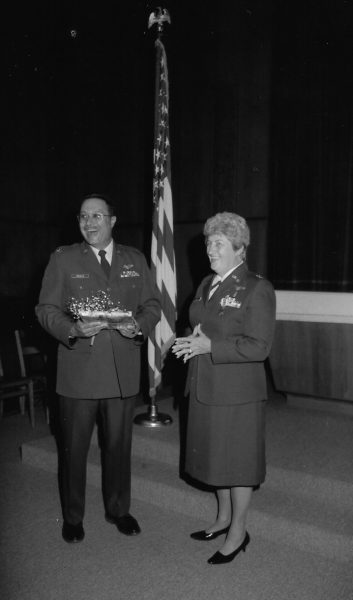
It was a combination of the Tet Offensive and the need to see more of the world that convinced her to join the Air Force. She was commissioned as a first lieutenant and went on active duty in January 1969.
“I wanted the challenge of not just regular bedside nursing. I went into the Air Force, and it was probably the best thing I ever did in my life.” Which is how she found her first stop on an exciting career — Judy was a flight nurse for one year as the Vietnam War was winding down. She was stationed in California at the Travis Air Force Base and served as a nurse on a 14-hour flight to the Philippines on a C-141 Starlifter, which would load up mostly critically wounded patients and fly them back to the U.S. They would make a stopover at Subic Bay to drop off supplies, and then another stop at Clark Air Base. There would be roughly 50 to 60 patients on each flight, with two nurses and three technicians.
“There were metal stanchions that had to be placed into the floor to hold the litters (the men). They would be three high or four high, which meant we had to climb up to the top one to take care of him. Usually, we would have a less critical one on top — those who just couldn’t sit up for the flight. And there were also people in the back who could sit up. They would be returning home but they weren’t critically ill — no IVs or ventilators, no major, major surgery.”
All of the patients who were boarded onto the plane had to be stabilized to make the 14-hour trip. They would have spent at least 30 days already at a hospital prior to the trip.
“Because it was such a long flight to Honolulu, there was nothing we could do for them up there if they went into respiratory arrest or something. I guess we could drag them on the floor and start CPR, but there was nothing like they have today with portable defibrillators.”
Judy and another nurse would make sure that the patients’ IVs were given continuously and administer any prescriptions that were prescribed by physicians. There would be dressing changes and documentation and monitoring of all patients.
Once they landed in Honolulu, the goal was to eventually get all of the wounded soldiers to facilities close to their homes.
There was some time, once her shift was over, for Judy to enjoy Hawaii. After sleeping for about 12 hours, Judy and her fellow colleagues would take advantage of their location and catch a bus into town or go to the beach, before they had to prepare to be back on shift again.
Judy was assigned stateside, overseas, and the Air Force sent her back to college. She received a three-year diploma from Wheeling Hospital’s School of Nursing, but the Air Force presented her with the opportunity to get her Bachelor’s of Science in Nursing, which she obtained from the University of Texas Health Science Center at San Antonio. Judy received all the degrees she could, which were necessary for promotion within the Air Force. Her last promotion was to full colonel in 1988. Judy retired in 1993 and stayed in Wichita Falls until 2008, when her brother’s illness brought her back to Wheeling. This year, 2020, is the year that Wheeling Hospital is celebrating 170 years of operation. Judy’s cape and cap will be displayed as part of Wheeling Hospital’s history during Nurse Appreciation Week.
“Nursing was the only thing that appealed to me.” — Lt. Commander Marie Pinto
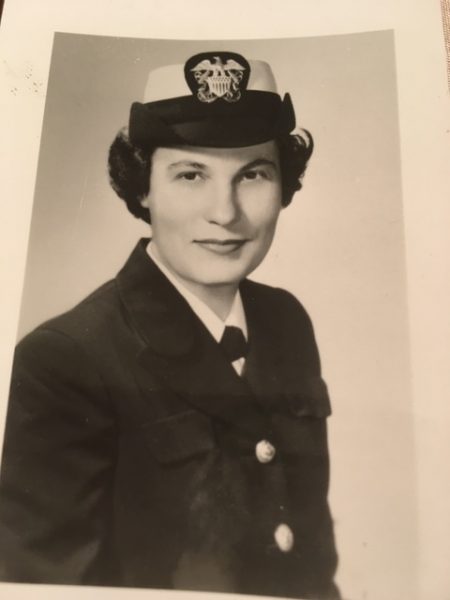
Lieutenant Commander Marie Pinto was born in Elm Grove and now resides in Woodsdale. There is a little bit of every place Marie has ever visited during her time as a Navy nurse in her house. She has knick-knacks and keepsakes from Japan and Naples, Italy, among many other places, that serve as reminders of her time helping others overseas.
“I always knew I wanted to be a nurse, so I went to Wheeling Hospital’s School of Nursing.” Marie went to Triadelphia High School, and, after attending the School of Nursing, she moved on to Duquesne University for her bachelor’s degree. “There were only so many schools that would offer a degree to someone who had three years of nursing school,” Marie explains of her decision to attend Duquesne. Marie worked as a civilian nurse for several years after college, but it was at Duquesne where she met a lot of nurses who had been in the military during the Korean War.
“That influenced me, and I knew that I wanted to be in the Navy, and so I just went down and volunteered. The idea of being assigned to a different hospital every couple of years did appeal to me, because I had a brother in the Navy and in the Army.”
IN THE NAVY
Marie joined the Navy in December of 1955, and her travels began. When asked where she was stationed during her career, Marie enthusiastically responds, “Oh, everywhere.” San Diego; Yokosuka, Japan; Guam; Naples; Oakland, California, and the list goes on. San Diego, the first place she was stationed, is one her favorites because it was all so new to her coming from West Virginia, with Japan and Naples coming in as second favorites. Marie had rotating tours where she taught corpsmen and was often only in one place for two to four years at a time.
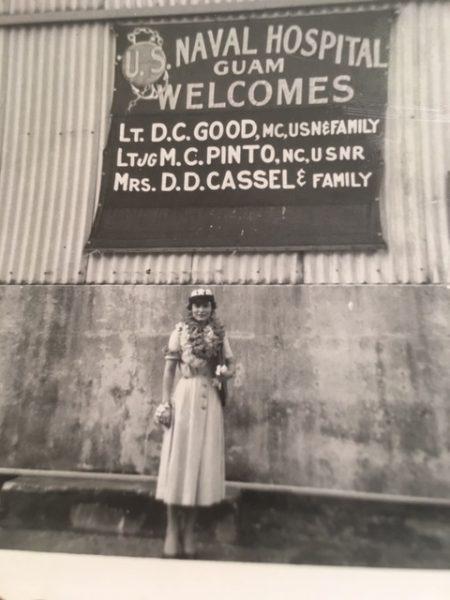
“Nursing is nursing, regardless. You start out as a floor nurse, and then you are promoted into head nurse and then supervisor. But you do basic nursing in the Navy. You do the same things you would do in civilian nursing.”
Being in the Navy, Marie maybe saw a younger clientele than civilian nurses with the Vietnam war happening, but she also took care of the military’s dependents, which meant pediatrics and women’s health. Marie did a little bit of every kind of nursing during her career, including delivering babies and taking care of sick children, with the operating room as her specialty.
While in Oakland, California, Marie was in the operating room during the Vietnam War. “That was such a vital part of nursing because we were the dropping off point for basically all the marines that came back, and they were the ones who were really wounded. They needed to have their wounds dressed every other day, so you were very busy.”
It was difficult seeing the effects of the war firsthand, and witnessing a lot of amputations was especially difficult for her.
“During this period, I also taught the corpsmen operating room techniques, which was a six-month course, so I wasn’t in the operating room every day.” Being an operating room supervisor and an OR instructor are some of the things Marie is most proud of when she looks back on her Navy career. She remembers a particularly special welcome when she arrived in Guam in 1958, with her name on a plaque and a lei placed around her neck.
“Every place doesn’t give you that kind of welcome. When the ships came in and there were some Navy personnel on it, they always went out and picked flowers and made leis.”
When explaining how she landed back in Wheeling after seeing so much of the world, she said, “Well, this is my home.” Her family continued to live in Wheeling, and she returned home for holidays when she could. It was custom to send Christmas greetings from where Navy nurses were stationed, and Marie’s mother kept the ones Marie sent, and they can now be found in Marie’s personal collection.
COMMON GROUND
Historian Margaret Brennan was very excited to finally get these two women together to share their stories, and rightly so. Shortly after ordering their food and settling in, and after Margaret broke the ice by passing out complimentary chocolates because she “always carries candy with her for a little something sweet at the end,” the questions began.
Even though they both had attended Wheeling Hospital’s School of Nursing, there is a 10-year age difference between the women, which resulted in a lot of questions to find out which nurses and doctors they both knew.
Guam and California were locations they had in common at different times in their careers. They swapped war stories of being nurses during the war, and war stories of working in Wheeling. For example, how when Wheeling Island flooded you could be stuck on shift for two days at a time before enough nurses could get to the hospital to relieve you. Marie knew exactly what it was like for Judy being a flight nurse, as she herself was flown back to the states when she hurt her back in Naples. But Marie was a patient, not the nurse, this time. Being a nurse is an extremely physically demanding job, and Marie had hurt herself lifting patients onto the operating table. Judy discussed how dirty, loud and cold the 141 planes they used to transport soldiers were. There was no insulation, so Judy would wear long johns under her uniform. While loading up in the Philippines they would get so hot and sweaty with their extra layers on, only to turn around and freeze during the flight.
Perhaps the most interesting moment of their meeting was finding out they had one special person in common.
Judy explained her need to leave Wheeling was because hospitals all over the country in bigger cities were doing bigger things. “There was so much going on in hospitals with ICUs and NICUs,” Judy explained, and Wheeling was more of a steppingstone if you wanted to further your career at that time. Marie agreed, and said her classmate and friend Rita Green had similar feelings and wanted to be a nurse in Washington D.C., and Marie decided to go with her.
In an odd coincidence, it turns out that Rita Green also happened to be Judy’s cousin.
Rita’s story is a tragic one, however, and a bit of Wheeling nursing folklore that Marie witnessed firsthand. Rita contracted tuberculosis while working as a nurse in Washington, D.C. During one of her treatments for the disease that should have been a routine procedure, something went terribly wrong, and Rita went into cardiac arrest. Because it happened in the 1940s when emergency resuscitation was much more difficult than it is today, the doctor did what he could do. Sadly, Rita fell into a coma, where she remained for the rest of her life. She was only 27 when she lost consciousness, and Marie and Judy lost their friend and cousin. Marie was with her immediately after and helped take care of Judy’s cousin before her career took her elsewhere. Eventually, years later, Rita Green was brought back to Wheeling to be with her family before she passed away. Discovering such a strong connection during Judy and Marie’s first meeting seemed to be proof that they were meant to meet up.
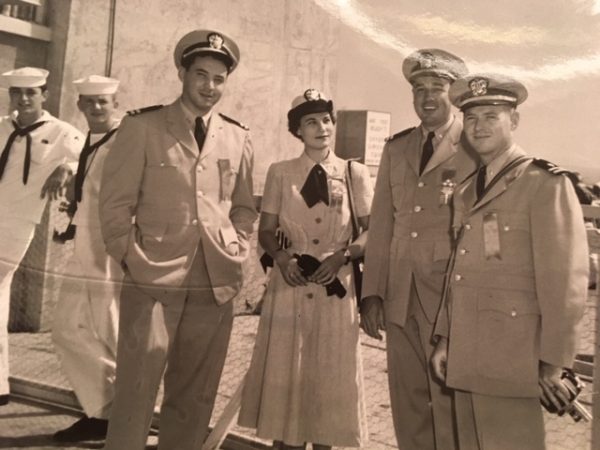
They also reminisced about how nursing has changed from their time to the present. Nursing was more hands-on during their careers, without the help or the complication — depending on how you look at it — of computers.
Marie spoke of her time as a recruiter for the Navy when she went from college to college, and how she was in charge of several large operating rooms during her career.
Judy was in Greece in the 1980s when Bobby’s Bar was bombed. Many of the victims were American airmen who were stationed nearby. They were all brought to Judy’s care while she arranged for them to be flown to other U.S. bases in Germany. This is a moment in history where one of Wheeling’s own was in charge of many lives, and none were lost.
These two women from Wheeling helped so many people in so many different places all over the world. When asked what her favorite thing about the Navy was, Marie answers without hesitation, “Everything.”
Both women saw their colleagues as families and feel proud of the work they have accomplished.
Their lunch on that sunny Saturday ended with the promise to meet up again soon. These two strong women finally sharing their experiences allows others to learn about their incredible careers and the determination and courage that got them there. Wheeling can claim Marie and Judy as their own, and their history is Wheeling’s history.
• Kelly Strautmann lives out in the country of Cameron, West Virginia, and proofreads in the city of Wheeling. She has a supportive and talented husband and two ridiculous daughters who keep her busy and full of love.


